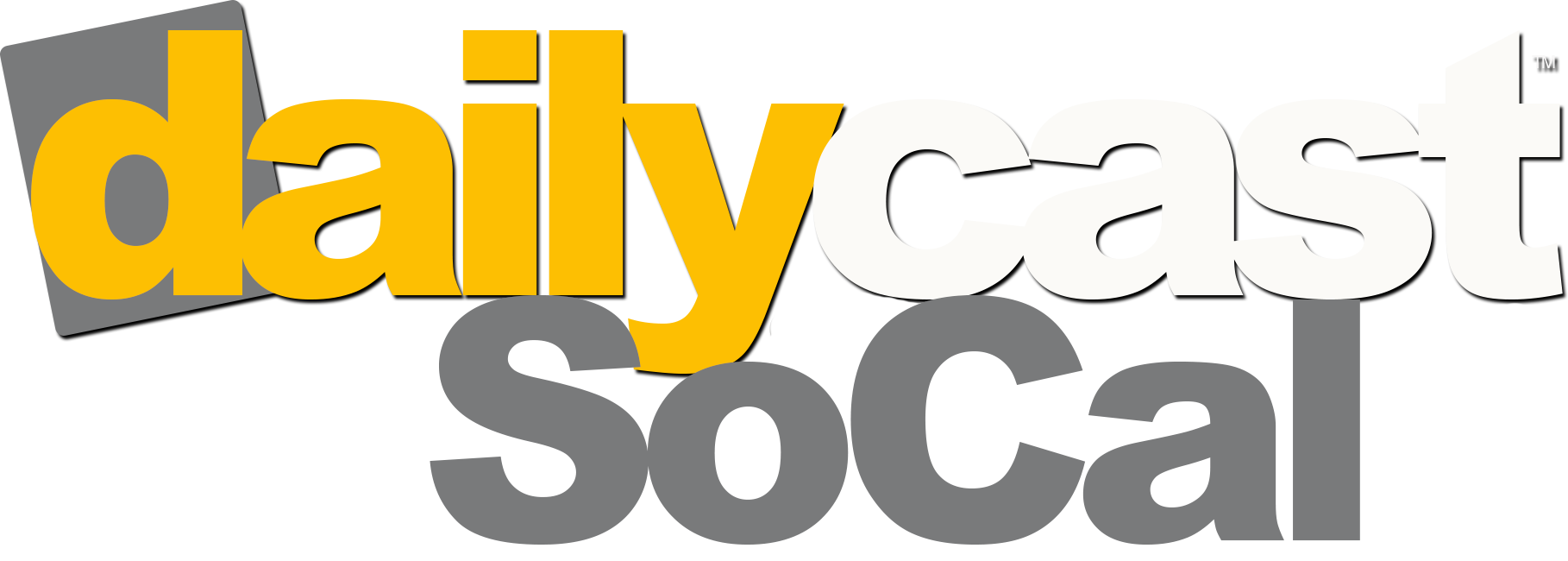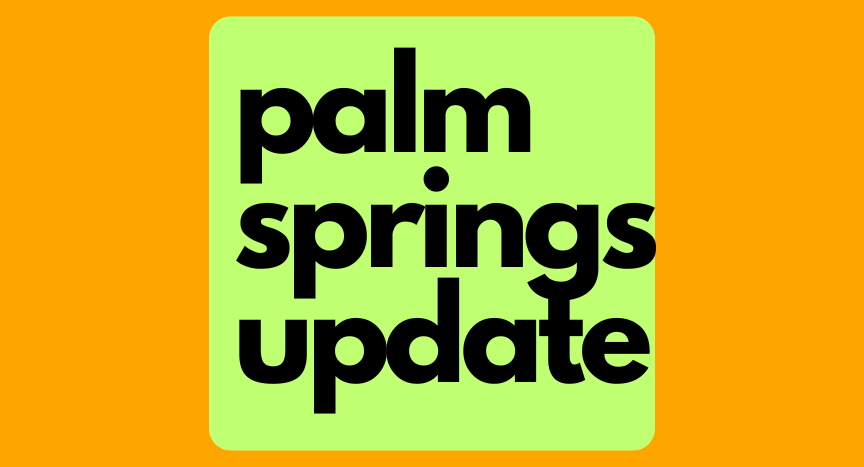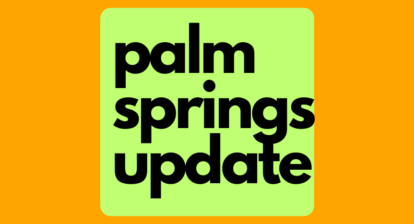PALM SPRINGS — Christopher Climie, who recently moved to Palm Springs, was supposed to be hosting visitors from his native Canada this week.
Ten friends — all gay men, like Climie — had planned to fly in from Toronto. They were going to trade the cold and rain for a hot desert weekend at the Coachella Valley Music and Arts Festival, where their beloved Lady Gaga is set to perform.
But because of tensions between Canada and President Trump, they canceled their plans.
Christopher Climie, a Canadian citizen, moved to Palm Springs with his American husband last year. He is caught in immigration limbo and has had Canadian friends cancel planned vacations to the Coachella Valley.
(Myung J. Chun/Los Angeles Times)
“They were like, ‘No, Gaga is not worth it,’” said Climie, 39. “For a gaggle of gays to say Gaga is not worth it? You know there’s a problem.”’
The Coachella Valley has long been a favorite destination for Canadian snowbirds, who pump millions of dollars into the local economy every year. Now, its desert towns are bracing for a major financial blow as northerners — citing Trump’s aggression toward Canada — cancel flights, ditch hotel and Airbnb reservations and put their second homes up for sale.
Climie’s Canadian cousin also nixed an upcoming trip with his wife and baby because of Trump. Another friend, bound for the Stagecoach music festival in Indio this month, canceled as well.
“Canadians, we’re a polite folk,” Climie said. “But it’s good to see that Canada is banding together. I have never seen Canadians act so American — so patriotic and so together and so in it and ready to fight.”
Midcentury Modern architecture in the Vista Las Palmas neighborhood in Palm Springs.
(Myung J. Chun / Los Angeles Times)
Last week, the city of Palm Springs hung red streetlight banners in its downtown business district proclaiming “Palm Springs ♥ Canada.” And Mayor Ron deHarte said city officials are anxiously monitoring sales tax and hotel occupancy figures.
Now that the peak snowbird season — roughly January through April — is wrapping up, he said, there is growing concern about the wave of cancellations for next winter.
“If this is something that lasts for a long time, we have to start working today to counter any negatives that may be coming from actions in Washington, D.C.,” DeHarte said.
“Is it concerning? Certainly. Canada is consistently our number one travel source.”
Since his reelection in November, Trump has upended the typically friendly relationship between the U.S. and its northern neighbor. He has mocked Canada by calling it America’s “51st state” and repeatedly referred to former Prime Minister Justin Trudeau as “governor.” And he has threatened to use “economic force” to annex the country, whose population of 40 million is about the same as California’s.
Trump in February invoked emergency powers to justify stiff new tariffs on Canadian imports, arguing in an executive order that the trafficking of illegal drugs — namely, fentanyl — across the northern border constituted a dire threat to American security.
After Trump’s separate 25% tariff on imported automobiles went into effect last week, Canadian Prime Minister Mark Carney, who called the levies a “direct attack” on his country, slapped a 25% retaliatory levy on vehicles imported from the United States.
In Canada, hockey and basketball fans have been booing “The Star-Spangled Banner” before NHL and NBA games. Retailers have been removing American liquor and California wine from their shelves. And elected officials have been encouraging residents to “buy Canadian.”
In Palm Springs, the snowbirds who were already here before Trump took office are leaving for the season. The question is: Will they return?
Palm tree-lined Rose Avenue in the Vista Las Palmas neighborhood in Palm Springs.
(Myung J. Chun / Los Angeles Times)
Two Canadian airlines this spring ended their seasonal service to and from Palm Springs International Airport earlier than initially planned, airport spokesman Jake Ingrassia said in a statement to The Times.
“Flair Airlines and WestJet have slightly shortened their seasonal service to Vancouver and Winnipeg, respectively,” Ingrassia said. “The airlines have advised the airport that these adjustments are in response to the current operating environment and shifts in demand.”
Kenny Cassady, director of business development for Acme House Co., which manages vacation rental properties in Palm Springs, said Canadians often book stays of one to three months a full year in advance, returning to the same properties annually.
“But when it comes to rebooking for next year? They’re just declining,” said Cassady, who also is a board member for Visit Greater Palm Springs, a tourism marketing agency for the Coachella Valley.
Palm Springs Mayor Ron deHarte says Canadians have a big impact on the local economy.
(Myung J. Chun / Los Angeles Times)
“It’s going to be most noticeable come next season. It could have a ripple effect beyond guests not booking to come back and spending rental dollars. If they’re not here, they’re also not going to restaurants and buying other services.”
A 2021 study done for Visit Greater Palm Springs found that Canadians owned 7% of second homes in the Coachella Valley, far more than any other country outside the United States. Another study, in 2017, found that roughly 303,600 Canadians visited the Coachella Valley that year, spending more than $236 million.
Laura Mezzacapo, accounting manager for the Vancouver-based travel agency the Travel Group, said that at this time of year, travel agents with her company would be busy booking spring break and summer vacations to the West Coast — especially to Las Vegas, Los Angeles, San Francisco and Palm Springs.
But since mid-February, bookings to the U.S. have plummeted. Corporate bookings, she said, are down 70% to 80%. And instead of vacations in the American West, clients are opting for Mexico.
A view of South Palm Canyon Drive in Palm Springs.
(Myung J. Chun / Los Angeles Times)
Mezzacapo said many Canadian travelers do not feel safe going to the U.S. now. They worry, she said, about getting stopped at the border. And LGBTQ+ travelers — especially transgender and nonbinary people who have the gender marker “X” on their passport — worry about harassment.
On Friday, the Canadian government updated its guidance for travel to the U.S., telling its citizens to “expect scrutiny” when crossing the border. The government warned that U.S. border agents have the authority to request passwords and search electronic devices — including laptops, phones and tablets — without providing a reason.
Mezzacapo herself had planned to travel to Palm Springs at the end of April.
“I said, ‘Let’s go somewhere where we can just chill. Nice pool. Heat. Direct flight. Palm Springs!’ I canceled it.”
“We feel disrespected,” she said of Canadians. “We’ve been your biggest ally. We’ve fought wars with you. We took your planes on 9/11. We love traveling to your country. We buy your products. And then you treat us like you don’t need us for anything?”
“Canadians will flock back to the States as soon as we feel respected again and a partner and an ally.”
Paul Kaplan, a Palm Springs real estate agent, said that, as of February, he and his team started getting calls from snowbirds looking to sell their second homes. He has at least five listings from Canadians and expects more in the coming weeks as the so-called high season for tourists comes to a close.
“They’re saying, ‘We just don’t feel welcome any more,’” Kaplan said.
The San Jacinto Mountains as seen from Sunrise Way in Palm Springs.
(Myung J. Chun / Los Angeles Times)
He added that “financially, it makes sense” for Canadians to sell their American property now, because the Canadian dollar is weak compared with its American counterpart. According to the Bank of Canada, the current exchange rate is roughly 1.40 Canadian dollars per U.S. dollar.
In a February blog post, Kaplan wrote that if a Canadian homeowner sold a home for $1 million in Palm Springs, an exchange rate of 1.36 Canadian dollars per each American dollar would yield $1,360,000 Canadian dollars, “a significant gain simply from currency conversion.”
Among the snowbirds considering leaving for good is Shirley Parchoma, a retired insurance broker from British Columbia.
For the last six years, she and her husband have leased a lot in a Desert Hot Springs recreational vehicle and mobile home park. They keep their fifth-wheel parked there year-round and typically stay in it from late November through early April, she said.
“It’s not a vacation. It’s a lifestyle. It’s our winter home,” said Parchoma, 68.
The Elvis Honeymoon Hideaway in Palm Springs.
(Myung J. Chun / Los Angeles Times)
But in February, they put up a For Sale sign outside their RV because of “the uncertainty of what’s coming” with the Trump administration. They considered spending winters in Mexico or Costa Rica instead of the Coachella Valley.
They returned to Canada in mid-March, a few weeks earlier than usual. They did not sell, in part because they had already summerized the RV and could not show it while they were away.
“It’s a wait-and-see kind of thing,” Parchoma said about returning. “A lot of Canadians in our park actually sold.”
Parchoma knows the local economy will feel the sting. She was surprised, during one trip, when a grocery store clerk asked her when Canadians typically leave, saying, “I want to know how soon I’m going to get my layoff notice.”
“When the snowbirds leave the Valley, things quiet down,” Parchoma said. “It’s an economic downturn for those employed during the snowbird season.”
Climie, a real estate agent and interior designer, moved to Palm Springs from the Toronto area last year with his Los Angeles-born husband, who has dual Canadian and American citizenship.
They had fallen in love with Palm Springs’ sunshine and arts scene and vibrant LGBTQ+ community. They rented a house, and Climie applied for a work permit and green card.
Climie got his authorization to work last week. But he has been in immigration limbo for more than a year.
Climie and his husband live in a condominium community, where many of his neighbors are Canadian snowbirds who started leaving “as soon as the election hit.”
The city of Palm Springs funded banners to that show support for Canadians. They were hung downtown in April.
(Myung J. Chun / Los Angeles Times)
He said his friends in Canada worry about him facing harassment in the U.S. for many reasons: because he’s Canadian. Because he’s an immigrant. Because he’s gay. Because he and his husband, who is of Guatemalan descent, are an interracial couple.
He tries to reassure them by saying California — Palm Springs in particular — is a liberal bubble. He tries to get them to come visit anyway, despite the uncertainty. But, for now, they won’t.
“I keep trying to tell people: ‘Come down and visit. We’re a bubble. Don’t worry. You’re safe and sound down here.’ And they’re like: ‘No. It’s still America.’”


